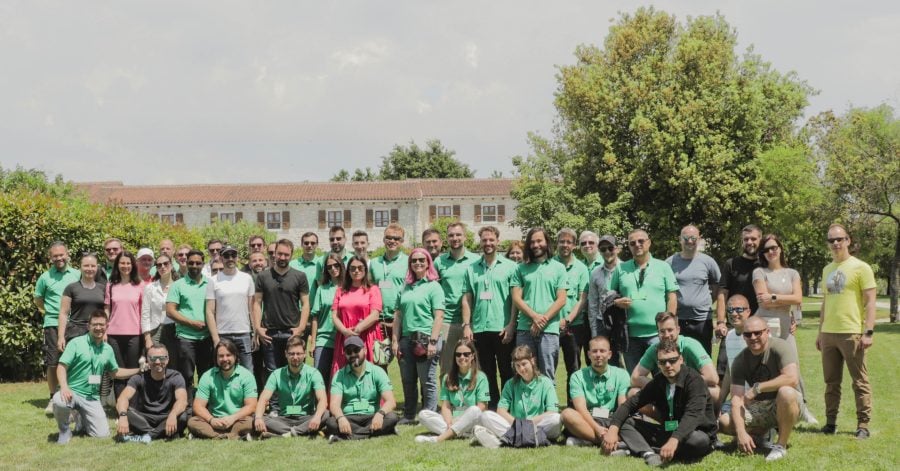In the startup journey, figuring out the right way to interact with investors can often be as challenging as building the business itself. At the recent Hellen’s Rock Founder Retreat, The Recursive founders Irina Obushtarova and Etien Yovchev had an opportunity to attend an open and honest discussion about this challenging topic. Portfolio founders shared insights about their journey, shedding light on common dilemmas and misconceptions while offering invaluable advice. Below is a summary of the conversation. In order to keep the text as candid and politically incorrect as possible, we are keeping the participants anonymous.
The Harsh Reality of Early-Stage Funding in CEE
According to what was shared, in most Central and Eastern European (CEE) startups, a mere $15-20 million post-money valuation requires three funding rounds. The first investor, often contributing just a few hundred thousand dollars, will often place immense pressure on the startup to demonstrate commercial traction — regardless of whether the product or customer base is ready for such expansion. Why this urgency? VCs have limited partners (LPs) to satisfy, and the quickest way to exhibit increased valuation is through early revenue generation growth.
Despite this pressure, most regional startups struggle to reach $100k in Monthly Recurring Revenue (MRR), forcing them to close a bridge round, further diluting their shares. This harsh reality leaves startups with a 15-20 million valuation after three rounds and a hefty dilution of 40-45%.
It was noted that, ideally, the same valuation could attract a $5 million seed round, allowing founders to retain 70% of their company while gaining the flexibility to spend several years developing their business, as opposed to the ceaseless struggle of fundraising all the time. But who might take such a risk in the CEE market? It’s likely that only seasoned entrepreneurs, those with the experience to understand the startup team’s potential to execute, would be willing to take this gamble. And hopefully, as the ecosystem develops, we will see more of those around.
In the current market conditions, however, startups must continually fundraise, a process that poses its unique challenges and insights.
Understanding Your Investor’s Motivations
Another key aspect of the discussion focused on the notion that startup founders need to understand who their investors are beyond the financial backing — identify who your long-term partners are and who might be just an “ATM” who has their own separate agenda. When establishing an enduring company, remember that while short-term victories can be valuable, maintaining a grander vision is essential.
The early stages of a startup can be precarious. There can be moments when a company teeters on the brink of failure. During these difficult times, the importance of understanding and empathy from investors is vital. It is crucial for a founder to be coachable, but more importantly, founders should be selective about their coaches.
When choosing a VC, the following should be considered: their long-term vision, founder-friendliness (more than LP-friendliness), the help they can provide, and their industry knowledge. While building personal relationships might seem like a top priority, remember that institutional investors often have their own objectives that could potentially change overnight.
It was mentioned that, surprisingly, in some cases, corporate venture capitals (CVCs), family offices, angels, and vertically aligned investors have proven to be more helpful than traditional backers. A VC with a strong financial background may often distance themselves from the founders, shifting the dynamic of the founder – investor relationship.
Navigating Funding Rounds in Current Market Conditions
Due to current market conditions, many startups, including those at the retreat, have realized the need to postpone their Series A round and focus on increasing their Annual Recurring Revenue (ARR). Fundraising has become a year-round activity, with nearly 30% of the founder’s time dedicated to it.
In these conditions, it is essential for founders to adopt an ‘always be funding‘ mentality to ensure the company’s survival. Running out of money is the quickest way to kill a startup, and having less than four months of runway in this market can be catastrophic. The strategy then becomes maintaining at least a year’s worth of runway at all times.
As market conditions have changed, so have the key performance indicators (KPIs) for funding rounds. Previously, rapid growth was the primary focus, with little concern for the burn ratio or sustainable growth. However, the current climate calls for proof of profitability and positive unit economics event at the seed stage. This has been described as ‘weird’ because at this stage, experimentation is still high, and pricing is still evolving.
In this confusing blend of market conditions, it has become increasingly difficult to discern who is doing what. But in any case, founders now need to consider the current market trends and what the market can offer them when strategizing their fundraising.
Prioritizing What’s Good for the Company, Not for the Investor
A common challenge among founders was managing conflicts with investors. Transparency around fundraising rounds is also often lacking, with financial VCs being hesitant to disclose valuations. This lack of information makes it challenging for founders to devise a strategy based on current market offerings.
Investor conflicts can also arise from misalignment in the company’s vision and strategy. An investor may favor short-term revenue generation, while the founder is more focused on long-term goals, such as creating a network effect.
Everyone agreed that it’s essential to recognize that the founder’s focus should always be on what’s good for the company, not necessarily what’s good for the investor. Institutional politics often muddle the process, and founders must learn to recognize and navigate these complex situations.
Last but not least, founders should remember that speed, confidence, and decisiveness are your strengths. These traits will help you maintain investor trust and help you navigate difficult circumstances. Ultimately, the key to managing an investor relationship is understanding their motivations, aligning them with your company’s goals, and ensuring transparency and open communication.








